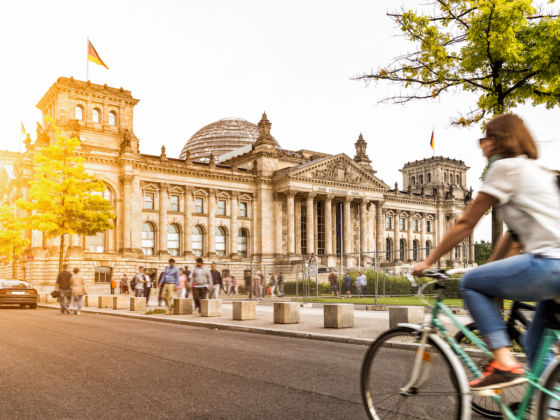

It's often said that Berlin, despite being the capital, is not Germany. Long established as a rebellious, rowdy, and particularly down-to-earth place, it goes against the grain of many national stereotypes: organization, perfection, cleanliness, even wealth. While it can be gritty and chaotic, the city nonetheless offers cultural splendors, rich architecture, and green spaces galore — as well as world-beating nightlife, fascinating history, and some increasingly excellent cafes, bars, and restaurants. A typical weekend here can easily take a visitor through the turbulent 20th century. with stops for pop-up brunches, affordable street eats or exquisite fine dining, edgy gallery openings, and, finally, clubs that seem to never close.
There’s never a bad time to visit Berlin. Arguably, the summer is best since the whole city seems to spill outside, and locals and visitors mingle in the wonderful array of city parks and local lakes. But spring and autumn are also very pretty, plus a little quieter on the tourist front, and the winters are increasingly mild. The great news is that there’s a constant slew of events all year round.
The currency throughout Germany is the euro, and the exchange rate is 0.84 per 1 USD. You can get your dollars exchanged at most banks and post offices, and you’ll find plenty of currency exchange kiosks (Wechselstuben) and ATMs. In terms of tipping, for smaller purchases like coffee and cake, or snacks, it’s fine to round up your bill up to the nearest €0.50 or €1, but for lunches and dinners, the standard is 10 percent minimum, with more if you feel the service was notably good. Tips are usually given directly to the server when you pay as opposed to leaving them on the table. You will also generally be asked if you want to pay together, as a couple or group, or separately.
Berlin is a very international city and English is widely spoken — but not everywhere and not by everyone, especially the older generation. There will always be situations where a bit of the local lingo can come in useful, whether it’s in a café, at a bus stop, or in the bank. Here are a few key words and phrases that might be useful to know:
BVG operates a well-run and very integrated system of trains, buses, and trams. U-(underground)- and S-(overground)-Bahn trains run daily from 4:30 AM to 12:30 AM, and all night long on Friday and Saturday. Hop on buses #100 and #200 for a free city tour; they drive past many famous landmarks, like Alexanderplatz, the Reichstag, and the Tiergarten. Bike-share and car-share options are all over the city, and although Uber is officially banned here, taxis work well and are reasonably priced.
Serious crime is relatively low in Berlin. In fact, it’s at a 30-year low throughout Germany. But petty crime is still fairly common, especially bike theft and pick-pocketing, so do be aware of your belongings, especially in crowded and tourist areas. Police often speak English; you can contact them in any emergency by dialing 110 (fire and ambulance are 112).
The best of the wurst.
The edgiest, most diverse street art anywhere
Beneath the shadow of the Wall, the modern-day soundtrack to a city was born.
The city is being reclaimed by nature.
Bretzels and bier to your heart’s content.
Get your drink on, naturally.
It’s the heart of Berlin’s counterculture vibe.
Seeing the city’s underground is as important as ever.